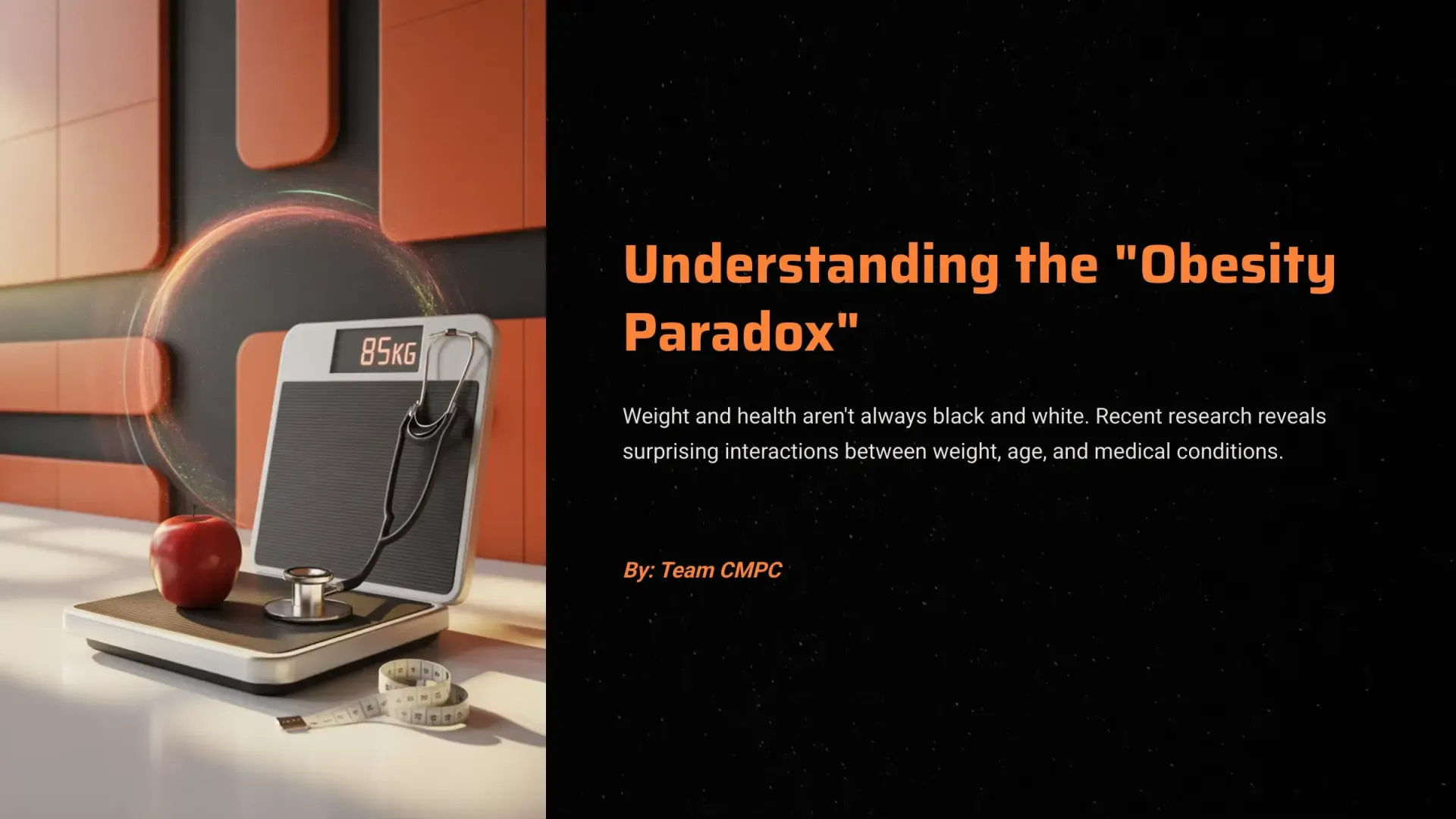
Many of our Nepean patients express concern about how their weight might impact their quality of life and life expectancy. This question reflects a genuine desire to understand the long-term implications of weight on overall health and longevity.
At Chatterjee Medicine Professional Corporation (CMPC), we offer clear and compassionate information to empower the community to make informed health decisions. This comprehensive guide will explore the link between BMI and life expectancy, emphasizing how various risk factors can be altered through appropriate interventions.
Understanding BMI and Its Limitations
Before discussing life expectancy, it's essential to understand what BMI does and doesn't and what it tells us about health.
What BMI Measures
Body Mass Index (BMI) is calculated by dividing your weight in kilograms by your height in square meters. This simple calculation provides a rough estimate of body fat and categorizes individuals as:
- Underweight: BMI less than 18.5
- Normal weight: BMI 18.5-24.9
- Overweight: BMI 25-29.9
- Obesity Class I: BMI 30-34.9
- Obesity Class II: BMI 35-39.9
- Obesity Class III: BMI 40 or higher
BMI is a screening tool to identify potential weight-related health risks but doesn't directly measure body fat or health status. The measurement provides a starting point for discussing weight and health but should be considered alongside other factors.
Important Limitations of BMI
While BMI is widely used, it has several notable limitations that local residents should understand:
- BMI doesn't distinguish between fat, muscle, and bone mass, potentially misclassifying muscular individuals as overweight. Athletes or people with high muscle mass might have elevated BMIs despite having healthy body fat percentages.
- BMI doesn't account for fat distribution, which significantly influences health risk. Two people with identical BMIs can have very different health profiles based on where they carry their weight.
Despite these limitations, population studies consistently show correlations between BMI categories and health outcomes, making it a useful if imperfect, tool for initial risk assessment.
The Relationship Between BMI and Life Expectancy
Research examining the link between weight and longevity has produced clear patterns, though individual variation always exists.
What Research Tells Us About BMI and Longevity
Large-scale studies have shown consistent relationships between BMI and life expectancy:
- Class III obesity (BMI ≥40) is associated with a reduction in life expectancy of approximately 8-10 years compared to normal weight. This substantial reduction is comparable to the effects of lifelong smoking.
- Class I obesity (BMI 30-34.9) is associated with a life expectancy reduction of about 3 years. Even this moderate elevation in BMI has measurable effects on longevity.
Understanding these statistical relationships for our patients concerned about longevity provides an important context for health decisions. However, these figures represent population averages, not individual predictions.
Weight-Related Causes of Reduced Life Expectancy
The impact of elevated BMI on life expectancy operates through several specific pathways:
- Cardiovascular disease accounts for approximately 70% of reduced longevity associated with obesity. Heart disease and stroke remain the leading causes of preventable death linked to high BMI.
- Type 2 diabetes significantly increases mortality risk and is strongly associated with excess weight. The complications of diabetes can affect multiple organ systems and reduce both quality and length of life.
- Certain cancers occur more frequently in individuals with obesity, contributing to reduced life expectancy. These include colorectal, breast, endometrial, kidney, and pancreatic cancers, among others.
Understanding these specific pathways helps illustrate that BMI doesn't reduce life expectancy; instead, it's the associated health conditions that develop over time that impact longevity.

The "Obesity Paradox" and Nuanced Understandings
The relationship between weight and longevity isn't always straightforward. Some research findings have added nuance to our understanding of how BMI affects life expectancy.
The "Obesity Paradox" Explained
Some studies have identified what researchers call the "obesity paradox," situations where having a moderately elevated BMI appears protective in specific contexts:
- For older adults (typically over 65), being in the overweight or mildly obese category is sometimes associated with lower mortality than being at "normal" weight. This finding may relate to having greater nutritional reserves during illness or frailty.
- For people with certain chronic conditions like heart failure or kidney disease, mildly elevated BMI sometimes correlates with better survival. The protective mechanism may involve greater energy reserves during these illness states.
These findings don't negate the overall relationship between significant obesity and reduced life expectancy but suggest the relationship is more complex than initially thought. For seniors especially, maintaining adequate nutritional status becomes an important consideration alongside weight management.
Weight Stability vs. Weight Cycling
The pattern of weight changes over time also influences longevity:
- Significant weight fluctuations (repeated cycles of weight loss and regain) may have negative health impacts independent of BMI. This "weight cycling" has been associated with increased mortality risk in some studies.
- Maintaining a stable weight, even if elevated, may be less detrimental than repeated weight cycling. This understanding has led to greater emphasis on sustainable approaches to weight management rather than dramatic short-term weight loss.
For our patients, this highlights the importance of gradual, sustainable approaches to weight management rather than extreme diets that lead to rapid weight loss followed by regain.
Beyond BMI: Other Factors That Influence Longevity
While BMI provides valuable information about potential health risks, many other factors influence life expectancy. In diverse communities, we consider these multiple dimensions of health.
Fitness vs. Fatness: The Impact of Physical Activity
Research increasingly shows that cardiorespiratory fitness significantly modifies the relationship between BMI and mortality:
- Individuals with obesity who maintain good cardiovascular fitness have substantially lower mortality risks than those with similar BMI but poor fitness. Regular physical activity provides protective benefits regardless of weight status.
- Being unfit poses a greater mortality risk than being overweight or obese. Studies suggest that low cardiorespiratory fitness is a stronger predictor of mortality than elevated BMI.
Increasing physical activity can improve longevity prospects even without significant weight changes for residents of the greater Ottawa region. The many parks and recreational facilities in and around Nepean provide excellent opportunities for increasing physical activity regardless of current fitness level.
Metabolic Health: A Critical Factor
Metabolic health status, whether your blood pressure, blood sugar, and cholesterol levels are normal, strongly influences how BMI affects longevity:
- Metabolically healthy obesity (elevated BMI without metabolic abnormalities) carries a significantly lower mortality risk than metabolically unhealthy obesity. Some individuals maintain normal metabolic parameters despite elevated BMI.
- Metabolic abnormalities in people with normal BMI can pose significant health risks. Having a normal weight doesn't guarantee metabolic health or lower mortality risk.
This understanding has led to more personalized approaches to risk assessment that consider metabolic health alongside BMI. Comprehensive evaluations that include metabolic markers provide a more complete picture than BMI alone for our patients.
Genetic and Environmental Influences
Individual genetic factors and environmental exposures modify how weight affects longevity:
- Genetic predisposition influences both weight regulation and susceptibility to weight-related complications. Some individuals have genetic factors that protect against certain obesity-related conditions despite elevated BMI.
- Environmental factors, including access to healthcare, educational opportunities, and socioeconomic resources, significantly impact how weight affects health outcomes. The diverse neighbourhoods may experience different environmental influences on health.
These individual variations underscore why personalized assessment is important when considering how weight might impact life expectancy.
Age Considerations: How Age Modifies Weight-Longevity Relationships
The relationship between BMI and life expectancy changes across the lifespan is important when interpreting health risks.
Young Adults and Middle Age
For younger and middle-aged adults, maintaining a healthy weight offers significant long-term benefits:
- Weight-related health impacts accumulate over time, making early intervention beneficial. The longer someone maintains a healthy weight, the greater the potential benefit to life expectancy.
- For adults under 65, there's a more direct relationship between elevated BMI and reduced life expectancy. The statistical association is influential in this age group.
Addressing weight concerns earlier rather than later for younger residents with elevated BMI offers the most significant potential benefit for long-term health.
Older Adults and Seniors
For older adults, the relationship between weight and longevity becomes more complex:
- After age 65, being somewhat overweight may be neutral or protective compared to being at the lower end of the "normal" BMI range. Having some energy reserves can be beneficial during illness or surgical recovery.
- Significant weight loss in seniors often signals underlying health problems and warrants medical evaluation. Unintentional weight loss in older adults is associated with increased mortality risk.
For seniors, maintaining muscle mass and functionality becomes increasingly important, sometimes taking priority over weight loss goals. Balance, strength, and overall physical function contribute significantly to this age group's quality of life and longevity.
Ethnic and Cultural Considerations
The diverse community includes people from many cultural backgrounds, and ethnic factors influence how BMI relates to health outcomes.
Ethnicity-Specific BMI Thresholds
Research shows that BMI thresholds for increased health risks vary by ethnic background:
- People of South Asian descent typically develop weight-related health complications at lower BMI levels than those of European descent. Health risks may begin to increase at BMI levels as low as 23 for this population.
- People of East Asian heritage also tend to experience metabolic complications at lower BMI thresholds. Adjusted guidelines recommend considering BMI 23-27.5 as "overweight" for these populations.
These differences reflect variations in body composition and fat distribution patterns between ethnic groups. For the multicultural community, culturally sensitive approaches to weight assessment help provide more accurate risk profiles.
Cultural Factors in Weight Management
Cultural attitudes toward food, body size, and physical activity significantly influence weight management:
- Traditional diets from different cultures vary widely in nutritional composition and health effects. Some conventional diets are naturally protective against weight-related health problems.
- Cultural norms surrounding body size and appearance affect weight management behaviours. It is essential to respect diverse cultural perspectives while offering evidence-based health information.
At CMPC, we strive to provide culturally sensitive care that respects individual backgrounds while offering evidence-based guidance for health optimization.
Modifiable Factors: Improving Life Expectancy Beyond Weight
While elevated BMI is associated with reduced life expectancy, many related risk factors are modifiable. For our patients, understanding these opportunities for improvement provides hope and direction.
Beyond Weight Loss: Other Paths to Improved Longevity
Research highlights several approaches that can improve life expectancy regardless of whether significant weight loss occurs:
- Regular physical activity improves longevity even without weight changes. Just 150 minutes of moderate activity weekly reduces mortality risk substantially.
- Dietary quality influences health outcomes independent of calorie intake. Mediterranean-style eating patterns are associated with lower mortality regardless of weight status.
- Avoiding tobacco, limiting alcohol, and managing stress all improve longevity prospects. These lifestyle factors have potent effects on health independent of weight.
For Ottawans and neighbouring areas concerned about weight and longevity, these additional approaches provide multiple avenues for health improvement.
The Impact of Weight Loss on Life Expectancy
For those who do achieve sustainable weight loss, research shows significant benefits:
- Losing 5-10% of body weight improves many obesity-related health complications. This relatively modest weight reduction provides substantial health benefits, potentially extending life expectancy.
- Weight loss that improves metabolic parameters like blood pressure, blood sugar, and cholesterol likely yields longevity benefits. The improvement in these markers often occurs before significant weight changes are visible.
The science suggests that even moderate weight improvements can positively impact longevity when maintained over time. For our patients, this means setting realistic, sustainable goals rather than aiming for dramatic transformations.
Assessing Your Risk Profile
While population studies provide valuable information about general trends, individual risk assessment requires a more personalized approach. In our clinic, we help patients understand their unique risk profiles.
Beyond BMI: Comprehensive Health Assessment
A complete evaluation considers multiple factors alongside BMI:
- Waist circumference provides important information about abdominal fat, a key risk factor. This simple measurement often gives more insight into metabolic risk than BMI alone.
- Blood pressure, blood sugar, and cholesterol levels indicate cardiovascular and metabolic health. These objective measurements help quantify current health status regardless of weight.
- Family history reveals genetic predispositions that influence how weight affects health. Knowing your family history helps identify which specific health conditions warrant the closest monitoring.
These assessments help create a personalized risk profile that goes beyond simple BMI categorization. This comprehensive approach provides more meaningful information for local communities than weight or BMI alone.
Personalized Risk vs. Population Statistics
Understanding the difference between population statistics and individual risk is crucial:
- Population studies show trends across large groups but can't predict individual outcomes. Statistical associations don't guarantee that any specific person will experience the average outcome.
- Genetics, lifestyle, and environmental variation significantly influence personal health trajectories. Your unique combination of factors creates a risk profile that differs from population averages.
For our patients, we emphasize that statistics inform but don't determine individual outcomes. Many factors within your control can positively influence your health regardless of your BMI.
Taking Action: Evidence-Based Approaches to Improving Health and Longevity
Considering how your weight might affect your life expectancy, consider these evidence-based approaches to improving your health outlook.
Medical Weight Management Options
For Canadians looking to address weight concerns, several effective options exist:
- The Allurion Gastric Balloon System offers a non-surgical approach to significant weight loss. This innovative option helps you feel fuller while developing healthier eating habits.
- Medically supervised weight management programs provide structure, accountability, and ongoing support. Professional guidance increases the likelihood of lasting results.
- Comprehensive approaches addressing diet, activity, behaviour, and underlying medical factors yield the best long-term outcomes. Addressing multiple factors simultaneously creates synergistic benefits.
At CMPC, we offer these evidence-based solutions focusing on sustainable results rather than quick fixes.
Lifestyle Approaches With Proven Benefits
Even without formal weight management programs, these approaches improve health outcomes:
- Regular physical activity, particularly a combination of aerobic exercise and strength training, provides powerful health benefits. Activity improves nearly every aspect of physical and mental health.
- Mediterranean-style eating patterns emphasizing vegetables, fruits, whole grains, lean proteins, and healthy fats support overall health. This flexible approach to eating has been associated with increased longevity.
- Adequate sleep (7-9 hours for most adults) supports metabolic health and weight management. Sleep quality affects numerous hormones involved in appetite regulation and metabolism.
- Stress management techniques like mindfulness, meditation, or yoga help regulate stress hormones influencing weight. Chronic stress undermines weight management efforts through multiple pathways.
These approaches benefit health regardless of whether they lead to significant weight changes. For residents, incorporating these habits into daily life can improve quality and potentially length of life.
When to Consider More Intensive Interventions
For some individuals, more significant interventions may be appropriate:
- People with BMI over 35 with related health conditions often benefit from more intensive approaches. At this level of obesity, health risks increase substantially, making more significant interventions appropriate.
- Those who have tried multiple lifestyle approaches without success may benefit from medical or surgical options. Previous unsuccessful attempts don't indicate personal failure but may suggest the need for additional support.
- Individuals with rapidly progressing weight-related health complications may need prompt intervention. When health is declining quickly, more intensive approaches may be warranted.
If you fall into these categories, discussing more comprehensive options with healthcare providers at our clinic can help identify appropriate next steps.
Hope and Perspective: A Balanced View of Weight and Longevity
While understanding health risks is essential, maintaining perspective and hope is equally crucial. For the well-being of our community, we emphasize several important points:
Small Changes, Significant Benefits
Research consistently shows that even modest improvements yield substantial health benefits:
- A 5-10% reduction in body weight significantly improves most obesity-related health conditions. This level of weight loss is achievable for many people with appropriate support.
- Adding 150 minutes of moderate physical activity weekly reduces mortality risk by approximately 30%, regardless of weight changes. This amount of activity is equivalent to five 30-minute walks per week.
- Improving diet quality, even without calorie restriction, provides measurable health benefits. Increasing vegetable and fruit intake while reducing processed foods can improve health markers.
These findings offer encouragement that perfect weight isn't required for meaningful health improvements. For people of any weight, positive changes yield tangible benefits.
Quality of Life Alongside Quantity
While life expectancy statistics focus on longevity, quality of life deserves equal consideration:
- Many weight management interventions improve quality of life independently of their effects on longevity. Reduced joint pain, improved energy, better sleep, and enhanced mood often occur early in the health improvement journey.
- Functional improvements, like more effortless movement, reduced shortness of breath, and greater stamina, significantly enhance daily life. These practical benefits often motivate continued healthy behaviours more effectively than abstract longevity statistics.
We recognize that quality-of-life improvements provide immediate, tangible benefits that complement long-term health goals.
Your Next Steps: Taking Control of Your Health Journey
If you're concerned about how your weight might affect your life expectancy, consider these practical next steps:
Start With Accurate Information
Begin with a comprehensive health assessment:
- Schedule a thorough evaluation at our clinic to understand your health status. This assessment provides a baseline from which to measure improvements.
- Know your numbers beyond weight, blood pressure, cholesterol, blood sugar, and waist circumference. These measurements provide more complete information about your current health status.
- Identify which specific health factors represent your most significant opportunities for improvement. This targeted approach focuses efforts where they'll yield the most important benefit.
Accurate information provides the foundation for effective action. Rather than relying on general statistics, understanding your specific health status guides more personalized interventions.
Focus on Sustainable Changes
Approach health improvement as a long-term journey:
- Identify small, sustainable changes you can maintain consistently. Modest improvements maintained over time yield greater benefits than dramatic changes quickly abandoned.
- Address the aspects of health that matter most to you personally. Connecting health changes to values that matter to you, like family, independence, or specific activities you enjoy, increases motivation.
- Build a supportive environment that makes healthy choices easier. Structuring your home and daily routines to support health goals reduces the need for constant willpower.
The sustainable approaches yield more lasting benefits than quick fixes or extreme measures.
Consider Professional Support
Don't hesitate to seek appropriate guidance:
- Explore the weight management options available at our Nepean clinic, including the Allurion Gastric Balloon System. Professional support increases success rates substantially.
- Consult with healthcare providers who take a comprehensive, non-judgmental approach to weight and health. The right medical partnership improves outcomes and makes the journey more positive.
- Connect with community resources that support healthy lifestyle changes. Group programs, fitness facilities, and community gardens provide practical support and social connection.
Professional guidance helps navigate the complex factors in weight and health, potentially saving years of trial and error.
Moving Forward: Balancing Concern With Hope
Understanding the relationship between BMI and life expectancy provides important information for health decisions. We at CMPC believe this knowledge should empower rather than discourage.
While elevated BMI is statistically associated with reduced life expectancy, many modifiable factors influence this relationship. Focus on the aspects of health within your control, celebrate improvements beyond weight changes, and remember that health exists along a spectrum rather than in categories of "perfect" or "poor."
Suppose you've found this information helpful and want to learn more about how sleep and energy levels are affected by weight. In that case, we recommend reading our related article: Will My Overweight Affect My Health in the Long Term?
Ready to take the next step in your health journey?
If you are a Nepean resident, contact us to schedule a FREE consultation with our medical experts.
Together, we can develop a personalized plan to improve your health and potentially extend quality and length of life. Call us NOW to book your appointment and start your journey toward better health.










